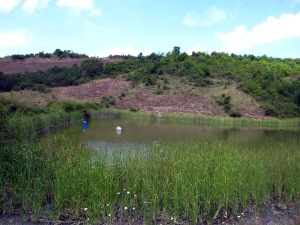Clockwise: aubergine growing in the garden; Barbialla Nuova’s lake; a spider makes its home amidst the blackberry brambles; drawing on the car’s dusty rear window for kids by kids
Over the last couple weeks while WWOOFing, I weeded a pumpkin patch, staked tomatoes, cleaned and revitalized a garden bed, created and turned compost piles, sanded and painted wood beams, and helped measure and construct a pergola. All these were activities I’d never done before. They were only the tip of the iceberg in what I learned while in Tuscany.
The thing is, volunteering with WWOOF is not simply a job or a means of traveling cheaply, it is adopting a lifestyle and exploring a set of values. I did it because I was interested in learning about sustainable agriculture and the rural lifestyle of a farmer, but I ended up getting crash courses on Australian folk music, parenting small children and welding. I was lucky to find a family who welcomed me into their daily routine, included me in meals and activities, and were genuinely interested in getting to know me. And although I initially wanted to live with an Italian family to improve my Italian, I am very happy that my host family was English-speaking because I wouldn’t have been able to connect beyond a superficial level otherwise.
A few lessons from an agrarian lifestyle:
- Resourcefulness and a can-do attitude are king on the farm. When you are far from town and every retailer is closed in August anyway, you find a way to make it work. If the square peg doesn’t fit into the circle bracket, by golly, we will saw it off and weld a new square bracket to fit the peg. Accordingly, you need a diverse skill set to employ on the farm. I was wholly impressed at Ken’s ability to plant pergola posts and bake sourdough bread, all in one afternoon. The farmer is truly today’s Renaissance man. As Thomas Jefferson wrote in 1803, “The class principally defective is that of agriculture. It is the first in utility, and ought to be the first in respect…It counts among it handmaids of the most respectable sciences, such as Chemistry, Natural Philosophy, Mechanics, Mathematics generally, Natural History, Botany. In every College and University, a professorship of agriculture, and the class of its students, might be honored as the first.” What would the world look like if farming and producing the nation’s supply of food were viewed as being just as important and honorable as the medical profession?
- Nature is an inextricable part of the landscape and “getting in touch with nature” literally means just that. Here, the insects are more frequent and larger in size. (Thus far tonight while writing this post, I’ve been hit in the head twice by beetles.) Bees and wasps abound, and field mice are not unusual visitors. One morning, Amy saw a snake in the living room. With typical farmer’s practicality, Ken responded by saying, “Well, maybe it’ll eat the mice.” Unlike their urban counterparts though, mice and flies in the country are not dangerous and don’t carry diseases.
- There is a strong deference to tradition and making things by hand. This is partly because farmers have the knowledge base to can vegetables or construct a shed from scratch, and partly because they understand the value added by artisanal production techniques. After hearing Ken’s discussion on how roller mills (most large commercial mills) and stone-ground mills produce flour, I was convinced that stone-ground flours are worth the minor price premium.
I am sad to leave Barbialla Nuova but all good things must come to an end. Time to look for a new WWOOF host in Piemonte?




Hey, I’m looking into WWOOFing in Tuscany this summer and really appreciated your posts. Thanks,
Amanda